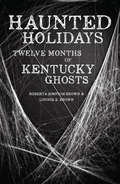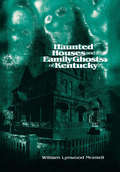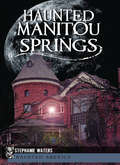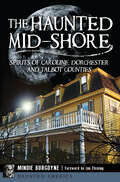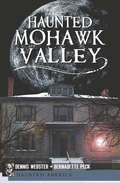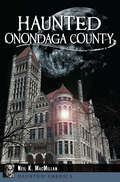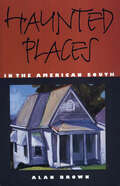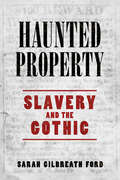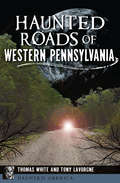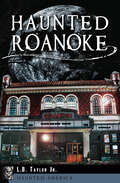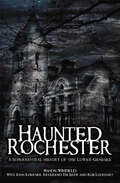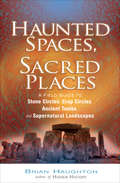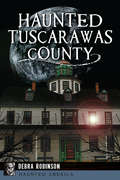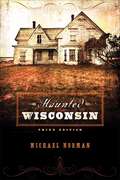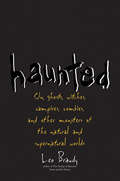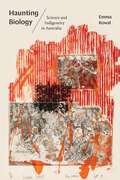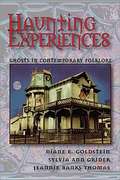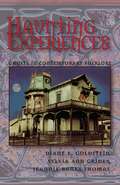- Table View
- List View
Haunted History of Old San Antonio (Haunted America)
by Lauren M. Swartz James A. SwartzEverything is bigger in Texas—including ghosts—especially in San Antonio, considered one of the ten most haunted cities in the world by National Geographic. As the saying goes, &“dead men tell no tales.&” Or do they? From its humble beginnings as a Spanish settlement in 1691 to the bloody battle at the Alamo, San Antonio&’s history is rich in haunting tales. Discover Old San Antonio&’s most haunted places and uncover the history that lies waiting for those who dare enter their doorways. Take a peek inside the Menger Hotel, the &“Most Haunted Hotel in Texas,&” and just a block away, peer into the Emily Morgan Hotel, renovated after a decade of being vacant, was once the city&’s first hospitals where many men and women lost their lives. Explore the San Fernando Cathedral, where people are buried within the walls and visitors claim to see faces mysteriously appear. Uncover the legends behind Bexar County Jail. Join authors James and Lauren Swartz and decide for yourself what truly lurks behind the Alamo City&’s fabled past. Includes photos!
Haunted Holidays: Twelve Months of Kentucky Ghosts
by Roberta Simpson Brown Lonnie E. Brown“From ghost dogs to phantom orbs, from dead spirits visiting and avenging wraiths, there is plenty . . . to keep skeptic and believer both enthralled.” —Thomas Freese, coauthor of Haunted Battlefields of the SouthWith its tales of benevolent and malicious specters, terrifying monsters, and unexplained phenomena, Halloween is the holiday most people associate with spooky stories. But do spirits remain hidden the rest of the year? In the rich storytelling customs of the commonwealth, the supernatural world is also connected with holidays such as Thanksgiving, Christmas, Valentine’s Day, and Memorial Day.In Haunted Holidays, celebrated storytellers Roberta Simpson Brown and Lonnie E. Brown have assembled a hair-raising collection of paranormal tales for readers of all ages. The stories present many new and spooky characters, including the deceased great aunt who still rocks in her favorite chair on Mother’s Day, the young boy who made good on his promise to return a silver dollar on the Fourth of July, and even the ghost who hated Labor Day. In addition to tales of haunting, the Browns reveal many Appalachian legends and their importance to the storytelling tradition, such as the phantom bells who guide the dead to the other side, and a “chime child” born when the clock strikes midnight on Christmas Day, who is rumored to be blessed with the gift of second sight.More than a collection of ghost stories or family legends, Haunted Holidays takes readers on a fireside journey that preserves and promotes oral traditions, revealing the importance of sharing beliefs, traditions, and values with a new generation of listeners.
Haunted Homes (Quick Takes: Movies and Popular Culture)
by Dahlia SchweitzerHaunted Homes is a short but groundbreaking study of homes in horror film and television. While haunted houses can be fun and thrilling, Hollywood horror tends to focus on haunted homes, places where the suburban American dream of safety and comfort has turned into a nightmare. From classic movies like The Old Dark House to contemporary works like Hereditary and the Netflix series The Haunting of Hill House, Dahlia Schweitzer explores why haunted homes have become a prime stage for dramatizing anxieties about family, gender, race, and economic collapse. She traces how the haunted home film was intertwined with the expansion of American suburbia, but also explores works like The Witch and The Babadook, which transport the genre to different times and places. This lively and readable study reveals how and why an increasing number of films imagine that home is where the horror is. Watch a video of the author discussing the topic Haunted Homes (https://youtu.be/_irTEfvtZfQ).
Haunted Houses and Family Ghosts of Kentucky
by William Lynwood MontellA Kentucky native and folk studies scholar presents a collection of haunting legends and stories of spirits from across the Bluegrass State.William Lynwood Montell has spent years documenting Kentucky’s rich legacy of ghostly visitations. Many of the stories were collected from elders by younger generations and are recounted here exactly as they were gathered. This volume introduces spirits such as the Tan Man of Pike County, who trudges invisibly through a house accompanied by the smell of roses, and the famed Gray Lady of Liberty Hall in Frankfort, a houseguest who never left.Montell tells the story of the ghost of Daniel Boone calling upon the statesman Henry Clay shortly before his death. He also recounts the tale of ghouls that haunt the rehearsal house of the band The Kentucky Headhunters. Readers will find accounts of haunted libraries, mansions, log cabins, bathrooms, furniture, hotels, and distilleries, as well as reports of eerie visitations from passed-on grandmothers, husbands, daughters, uncles, cousins, babies, slaves, Civil War soldiers, dogs, sheep, and even wildcats.Almost every county in Kentucky is represented. Though the book emphasizes the stories themselves, Montell offers an introduction discussing how local history, and local character, are communicated across the generations in these colorful stories.
Haunted Manitou Springs (Haunted America)
by Stephanie WatersDrink in the spooky spiritual history of this charming Rocky Mountain town—from the author of Colorado Legends & Lore. Manitou Springs has long been known as a spiritual hot spot. From the healing waters of the local springs to the town's patron spirit, the benevolent Emma Crawford, whose life and afterlife is celebrated annually at Halloween, Manitou Springs takes pride in its legends and legendary residents. Join haunted tour guide Stephanie Waters as she uncovers the stories behind some of Manitou&’s most famous ghostly tales: the historic spirit lights on Pikes Peak, the specters of Red Stone Castle where poor Emma&’s sister went mad and the phantoms of the stately Cliff House and Briarhurst Manor. Includes photos! &“Stephanie Waters, author of Haunted Manitou Springs, theorizes that the greenstone rock, which is plentiful at Red Crags, attracts extra energy in a town that&’s already no stranger to the mystical. The word Manitou even means spirit.&” —Manitou Marquee
Haunted Mid-Shore, The: Spirits of Caroline, Dorchester and Talbot Counties (Haunted America)
by Ian Fleming Mindie BurgoyneThere is an otherworldly quality to the Mid-Shore--ghosts seem to rise up from the Chesapeake, and quaint towns hold the spirits of their historic pasts. Oxford's Robert Morris Inn is still home to its colonial namesake, while the Kemp House in St. Michael's is host to the restless specter of Robert E. Lee. Murdered actress Marguerite rides the elevator of the Avalon Theater, and Wish Sheppard stalks the halls of the Denton Jail. Near the witching hour, the eerie sound of the swinging body of "Bloody" Henny Insley can be heard on the grounds of the Dorchester Courthouse. Author and ghost tour guide Mindie Burgoyne takes a chilling journey into the supernatural lore of Maryland's Mid-Shore.
Haunted Mohawk Valley: Mohawk Valley Ghosts And Other Historic Haunts (Haunted America)
by Dennis Webster Bernadette PeckHead toward central and upstate New York and discover this region&’s ghostly history . . . photos included! The Mohawk River winds through upstate and central New York, and along its meandering path residents and visitors have encountered the supernatural. In Utica, ghosts grace the stage of the Stanley Theater. Spirits of Revolutionary War soldiers still march on the Oriskany Battlefield and linger in Schoharie&’s Old Stone Fort. And some former residents of Beardslee Castle in St. Johnsville, Boonville&’s Hulbert House, and the Seashell Inn of Sylvan Beach have resisted vacating. Here, authors Dennis Webster and Bernadette Peck, along with the other members of Ghost Seekers of Central New York, uncover the mysteries behind these and many other haunted places of the Mohawk Valley.
Haunted Nations: The Colonial Dimensions of Multiculturalisms (Transformations)
by Sneja GunewPostcolonialism has attracted a large amount of interest in cultural theory, but the adjacent area of multiculturalism has not been scrutinised to quite the same extent. In this innovative new book, Sneja Gunew sets out to interrogate the ways in which the transnational discourse of multiculturalism may be related to the politics of race and indigeneity, grounding her discussion in a variety of national settings and a variety of literary, autobiographical and theoretical texts. Using examples from marginal sites - the "settler societies" of Australia and Canada - to cast light on the globally dominant discourses of the US and the UK, Gunew analyses the political ambiguities and the pitfalls involved in a discourse of multiculturalism haunted by the opposing spectres of anarchy and assimilation.
Haunted New Orleans: History & Hauntings of the Crescent City (Haunted America)
by Troy TaylorTravel beyond Bourbon Street into the macabre history of one of the most haunted cities in the United States with the author of Wicked New Orleans as your guide. New Orleans—the Big Easy, the birthplace of jazz, home of Cafe du Monde and what some call the most haunted city in America. Beneath the indulgence and revelry of the Crescent City lies a long history of the dark and mysterious. From the famous &“Queen of Voodoo,&” Marie Laveau, who is said to haunt the site of her grave, to the wicked LaLauries, whose true natures were hidden behind elegance and the trappings of high society, New Orleans is filled with spirits of all kinds. Some of the ghosts in these stories have sordid and scandalous histories, while others are friendly specters who simply can&’t leave their beloved city behind. Join supernatural historian Troy Taylor as he takes readers beyond the French Quarter and shows a side of New Orleans never seen. Includes photos!
Haunted Old Forge (Haunted America)
by Dennis Webster Bernadette PeckDiscover the paranormal past of this little town in the Adirondacks . . . photos included! Spirits linger on the pine-covered slopes of the Adirondack Mountains that surround Old Forge. Books fly off the shelves at the Maxson House, and something—or someone—spies on the living from the attic window of the Goodsell Museum. The spirit of Mohawk Peter Waters is said to linger along the shores of First Lake, where an assassin killed him in 1833. The scent of a phantom cigar hints at the presence of the former owner of the Strand Theatre. In this book, Dennis Webster and Bernadette Peck and the Ghost Seekers of Central New York take a chilling journey into the paranormal history of what may be the most haunted town in the nation.
Haunted Onondaga County (Haunted America)
by Neil MacmillanFrom the halls of Syracuse University to the quiet neighborhoods of Fayetteville and Marcellus, the communities of Onondaga County have a haunted history. Some sites are hotbeds of paranormal activity, like Syracuse's Woodlawn Cemetery, the Jamesville Penitentiary and Split Rock Quarry, where a blast killed several workers. Visitors at the Clay Hotel debate whose ghost walks the halls of the former German beer house and restaurant. Patrons of the Ancestor's Inn in Liverpool have also encountered unregistered and unwelcome guests. After Albert Fyler murdered his wife in a jealous rage, their spirits refused to leave the home they shared. Even the iconic Syracuse City Hall cannot rid itself of the otherworldly. Local author Neil K. MacMillan delves into this eerie past to uncover Onondaga County's most haunted locations.
Haunted Places in the American South
by Alan BrownBefore Alan Brown wrote Haunted Places in the American South, only the locals knew what was lurking in these locations. Slamming doors, eerie lights, and Confederate soldiers' ghosts kept some folks too scared to talk with outsiders. Above Peavey Melody Music in Meridian, Mississippi, children may be heard giggling and running down an abandoned hallway that turns icy cold. At the Jameson Inn in Crestview, Florida, an apparition appears on surveillance tapes after filling the lobby with sweet-smelling cigar smoke. Seldom told and rarely—if ever—printed stories such as these join tales from haunted inns, mansions, forests, ravines, and prisons to create Haunted Places in the American South. The book collects ghost stories from fifty-five historically haunted sites in Alabama, Arkansas, Florida, Georgia, Kentucky, Louisiana, Mississippi, North Carolina, South Carolina, Tennessee, Texas, and Virginia. Alan Brown gathered these stories from newspapers, magazines, museum directors, archaeologists, hotel managers, and many others who shared their disturbing experiences. Most of these stories have never appeared in book form, and some, such as the haunting of Peavey Melody Music, have never been published at all. Haunted Places in the American South differs from most other collections of southern ghost stories, for the featured sites include more than just haunted houses. Bridges, forts, governors' mansions, prisons, hotels, woods, theaters, cemeteries, and even a large rock are included as focal points for these tales. The book provides directions to the sites, notes, and a bibliography that will be useful to folklore scholars and to travelers seeking that cold and creepy brush with the supernatural.
Haunted Property: Slavery and the Gothic
by Sarah Gilbreath FordWinner of a 2021 South Central Modern Language Association Book PrizeAt the heart of America’s slave system was the legal definition of people as property. While property ownership is a cornerstone of the American dream, the status of enslaved people supplies a contrasting American nightmare. Sarah Gilbreath Ford considers how writers in works from nineteenth-century slave narratives to twenty-first-century poetry employ gothic tools, such as ghosts and haunted houses, to portray the horrors of this nightmare. Haunted Property: Slavery and the Gothic thus reimagines the southern gothic, which has too often been simply equated with the macabre or grotesque and then dismissed as regional. Although literary critics have argued that the American gothic is driven by the nation’s history of racial injustice, what is missing in this critical conversation is the key role of property. Ford argues that out of all of slavery’s perils, the definition of people as property is the central impetus for haunting because it allows the perpetration of all other terrors. Property becomes the engine for the white accumulation of wealth and power fueled by the destruction of black personhood. Specters often linger, however, to claim title, and Ford argues that haunting can be a bid for property ownership. Through examining works by Harriet Jacobs, Hannah Crafts, Mark Twain, Herman Melville, Sherley Anne Williams, William Faulkner, Eudora Welty, Toni Morrison, Octavia Butler, and Natasha Trethewey, Ford reveals how writers can use the gothic to combat legal possession with spectral possession.
Haunted Roads of Western Pennsylvania (Haunted America)
by Thomas White Tony LavorgneThe twisty roads—and twisted tales—of the Appalachian Mountains make for distracted driving in western Pennsylvania. Ghostly travelers are said to wander the lonely roads of western Pennsylvania. A creeping fog rises from Blue Mist Road, and stories of car crashes, lynchings and even strange beasts haunt this isolated stretch outside Pittsburgh. Is it the angry spirit of a jealous husband or a gypsy king who stalks Erie County&’s Axe Murder Hollow? Shades of Death Road in Washington County may be host to phantom coal miners killed during a deadly labor dispute. With firsthand accounts and historical research, authors Thomas White and Tony Lavorgne travel the backcountry roads and byways of western Pennsylvania to discover their ghost tales and mysterious legends. Includes photos! &“The authors include a history of each road along with the supernatural legends and other unexplained activity. Surprisingly, they are able to provide possible explanations for most of the alleged hauntings, but admit that they cannot account for every one, which allows the roads in question to keep their allure and spooky possibilities.&” —PopCultureGuy
Haunted Roanoke (Haunted America)
by L.B. Taylor Jr.The author of The Big Book of Virginia Ghost Stories focuses on the &“Scare City&”: &“If you believe in ghosts, this is the book for you&” (The Roanoke Times). Roanoke, in the heart of southwestern Virginia, is one of the most haunted cities in the commonwealth. The Star City is brimming with eerie and unexplainable stories, such as the legendary &“Woman in Black,&” who appeared several times in 1902, but only to married men on their way home at night. There are also macabre stories in many of Roanoke&’s famous landmarks, such as the majestic Grandin Theatre, where a homeless family is said to have lived—and the cries of their deceased children can still be heard. Travel beyond the realm of reality with author L.B. Taylor Jr. as he traces the history of Roanoke&’s most unique and chilling tales. Includes photos! &“I like the ghost story books of L.B. Taylor, Jr., a Virginia author, because he blends history and true ghost stories so wonderfully. He doesn&’t make judgments about each ghost story, but presents the facts and lets you decide for yourself. . . . So if you&’re in a ghostly mood this October—or if you&’re just a history lover—Taylor&’s books are well worth your time.&” —Eagle-Eyed Editor
Haunted Rochester: A Supernatural History of the Lower Genesee (Haunted America Ser.)
by Mason Winfield Rob Lockhart John Koerner Reverend Tim ShawThe western New York state Great Lakes region serves as a scenic setting for supernatural traditions, incidences, and folklore. Avenging specters, demon-tortured roads, holy miracles, weird psychic events, prehistoric power sites, ancient curses, Native American shamans, active battlefields, ghost ships, black dogs, haunted monuments, and the phantoms of Rochester&’s famous—all are part of the legacy of Rochester and the lower Genesee. Supernatural historian Mason Winfield and the research team from Haunted History Ghost Walks, Inc., take us on a spiritual safari through the Seneca homeland of the &“Sweet River Valley&” and the modern city in its place. After their survey of Rochester&’s super natural history and tradition, &“the Flour City&” will never look the same. Includes photos!
Haunted South Georgia (Haunted America)
by Jim MilesEach county in the vast territory of southern Georgia has a haunted history. The old Barber-Tucker Inn in Colquitt County and the renovated former Scottish Inn in Bryan County host ghostly guests. A profane spirit disturbed a house's former residents with vile language. The Hairy Man still searches a swamp for his long-lost son. A Dodge County ghost twice saved the lives of a family's children, while one in Liberty County mysteriously extinguished a fire that would have destroyed a historic house. Ghosts in Randolph County and Echols County provided the living with evidence sufficient to convict their murderers. Join author Jim Miles as he recounts stories from the fifty-seven counties of the region.
Haunted Spaces, Sacred Places: A Field Guide to Stone Circles, Crop Circles, Ancient Tombs, and Supernatural Landscapes
by Brian HaughtonThe author of Hidden History explores the archaeology, legends and strange sightings at 32 ancient sites around the world—from Stonehenge to Angkor Wat. In Haunted Spaces, Sacred Places, historian Brian Haughton takes readers on a revealing tour of ancient landmarks that are rich in mystery and unexplained phenomena. Organized by region, this book takes readers from the mysterious megaliths of Britain and Ireland to the haunted tombs of the Etruscans, the Pagan origins of Germany's Aachen Cathedral, the ancient Native American city of Cahokia, the enigmatic Cambodian Temple of Angkor Wat, and the sacred Aboriginal rock formation of Uluru. In Haunted Spaces, Sacred Places you will discover: The history of ancient sites such as Stonehenge, Chartres Cathedral, Delphi, Cuzco, and the Ohio Serpent Mound.The relationship between ancient Native American sites and unexpected phenomena in Colorado&’s San Luis Valley.The truth behind the legends of the mausoleum of the First Qin Emperor in China, home of the Terracotta Warriors.The prevalence of modern encounters with ghosts, UFOs, spook lights, Bigfoot, and phantom dogs at ancient sacred places. With more than 25 photographs and illustrations, this is the ideal reference work for those interested in the connections between ancient places, folklore, and unexplained phenomena.
Haunted Tuscarawas County (Haunted America)
by Debra RobinsonTuscarawas County's history stretches back to the pioneer era. Some history, however, refuses to remain in the past. Towns and sites founded in the 1700s and 1800s, like Zoar, Schoenbrunn and Dennison Depot, abound with legends and spectral encounters. Helpful haunts reside at the Little Theatre and Dover Public Library. The sad specter of poor axe-murdered Mary Seneff rises from the Red Hill bridge over little Sugarcreek. And Newcomerstown's young post boy, William Cartmill, still tries to deliver his mail. Author Debra Robinson delves into the area's ghost tales and the history behind them.
Haunted Wisconsin
by Michael NormanGrab a cozy blanket, light a few flickering candles, and enjoy the unnerving tales ofHaunted Wisconsin. Gathered from personal interviews with credible eyewitnesses, on-site explorations, historical archives, newspaper reports, and other sources, these scores of reports date from Wisconsin’s early settlement days to recent inexplicable events. You’ll read about Wisconsin’s most famous haunted house, Summerwind; three Milwaukee men who encountered the beautiful ghost of National Avenue; a phantom basketball player; a spectral horse that signaled death in the pioneer era of the Wisconsin Dells; a poltergeist in St. Croix County who attracted a crowd of more than three hundred spectators; the Ridgeway Ghost who haunts the driftless valleys of southwestern Wisconsin; a swinging railroad lantern held by unseen hands; the Ghost Island of the Chippewa Flowa≥ and many others. Are ghosts real? That’s for you to decide! Now available in a Third Edition with updates and several new accounts,Haunted Wisconsinremains a favorite collection of unexplained midwestern tales, enjoyed by readers of all ages.
Haunted by Hitler: Liberals, the Left, and the Fight against Fascism in the United States
by Christopher VialsAlthough fascism is typically associated with Europe, the threat of fascism in the United States haunted the imaginations of activists, writers, and artists, spurring them to create a rich, elaborate body of cultural and political work. Traversing the Popular Front of the 1930s, the struggle against McCarthyism in the 1950s, the Black Power movement of the 1960s, and the AIDS activism of the 1980s, Haunted by Hitler highlights the value of “antifascist” cultural politics, showing how it helped to frame the national discourse. Christopher Vials examines the ways in which anxieties about fascism in the United States have been expressed in the public sphere, through American television shows, Off-Broadway theater, party newspapers, bestselling works of history, journalism, popular sociology, political theory, and other media. He argues that twentieth-century liberals and leftists were more deeply unsettled by the problem of fascism than those at the center or the right and that they tirelessly and often successfully worked to counter America’s fascist equivalents.
Haunted: On Ghosts, Witches, Vampires, Zombies, and Other Monsters of the Natural and Supernatural Worlds
by Leo BraudyAn award-winning scholar and author charts four hundred years of monsters and how they reflect the culture that created them Leo Braudy, a finalist for both the National Book Award and the National Book Critics Circle Award, has won accolades for revealing the complex and constantly shifting history behind seemingly unchanging ideas of fame, war, and masculinity. Continuing his interest in the history of emotion, this book explores how fear has been shaped into images of monsters and monstrosity. From the Protestant Reformation to contemporary horror films and fiction, he explores four major types: the monster from nature (King Kong), the created monster (Frankenstein), the monster from within (Mr. Hyde), and the monster from the past (Dracula). Drawing upon deep historical and literary research, Braudy discusses the lasting presence of fearful imaginings in an age of scientific progress, viewing the detective genre as a rational riposte to the irrational world of the monstrous. Haunted is a compelling and incisive work by a writer at the height of his powers.
Haunting Biology: Science and Indigeneity in Australia (Experimental Futures)
by Emma KowalIn Haunting Biology Emma Kowal recounts the troubled history of Western biological studies of Indigenous Australians and asks how we now might see contemporary genomics, especially that conducted by Aboriginal and Torres Strait Islander scientists. Kowal illustrates how the material persistence of samples over decades and centuries folds together the fates of different scientific methodologies. Blood, bones, hair, comparative anatomy, human biology, physiology, and anthropological genetics all haunt each other across time and space, together with the many racial theories they produced and sustained. The stories Kowal tells feature a variety of ghostly presences: a dead anatomist, a fetishized piece of hair hidden away in a war trunk, and an elusive white Indigenous person. By linking this history to contemporary genomics and twenty-first-century Indigeneity, Kowal outlines the fraught complexities, perils, and potentials of studying Indigenous biological difference in the twenty-first century.
Haunting Experiences: Ghosts in Contemporary Folklore
by Diane E. Goldstein Sylvia Ann Grider Jeannie Banks ThomasGhosts and other supernatural phenomena are widely represented throughout modern culture. They can be found in any number of entertainment, commercial, and other contexts, but popular media or commodified representations of ghosts can be quite different from the beliefs people hold about them, based on tradition or direct experience. Personal belief and cultural tradition on the one hand, and popular and commercial representation on the other, nevertheless continually feed each other. They frequently share space in how people think about the supernatural. InHaunting Experiences,three well-known folklorists seek to broaden the discussion of ghost lore by examining it from a variety of angles in various modern contexts. Diane E. Goldstein, Sylvia Ann Grider, and Jeannie Banks Thomas take ghosts seriously, as they draw on contemporary scholarship that emphasizes both the basis of belief in experience (rather than mere fantasy) and the usefulness of ghost stories. They look closely at the narrative role of such lore in matters such as socialization and gender. And they unravel the complex mix of mass media, commodification, and popular culture that today puts old spirits into new contexts.
Haunting Experiences: Ghosts in Contemporary Folklore
by Jeannie Banks Thomas Diane Goldstein Sylvia GriderGhosts and other supernatural phenomena are widely represented throughout modern culture. They can be found in any number of entertainment, commercial, and other contexts, but popular media or commodified representations of ghosts can be quite different from the beliefs people hold about them, based on tradition or direct experience. Personal belief and cultural tradition on the one hand, and popular and commercial representation on the other, nevertheless continually feed each other. They frequently share space in how people think about the supernatural. In Haunting Experiences, three well-known folklorists seek to broaden the discussion of ghost lore by examining it from a variety of angles in various modern contexts. Diane E. Goldstein, Sylvia Ann Grider, and Jeannie Banks Thomas take ghosts seriously, as they draw on contemporary scholarship that emphasizes both the basis of belief in experience (rather than mere fantasy) and the usefulness of ghost stories. They look closely at the narrative role of such lore in matters such as socialization and gender. And they unravel the complex mix of mass media, commodification, and popular culture that today puts old spirits into new contexts.

